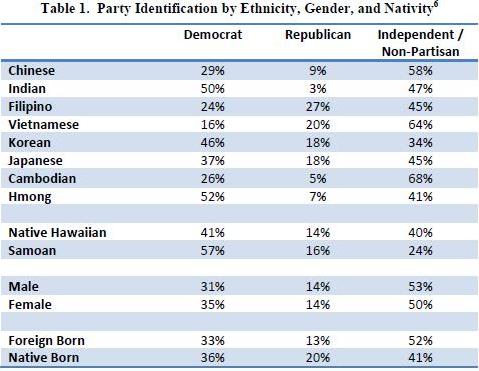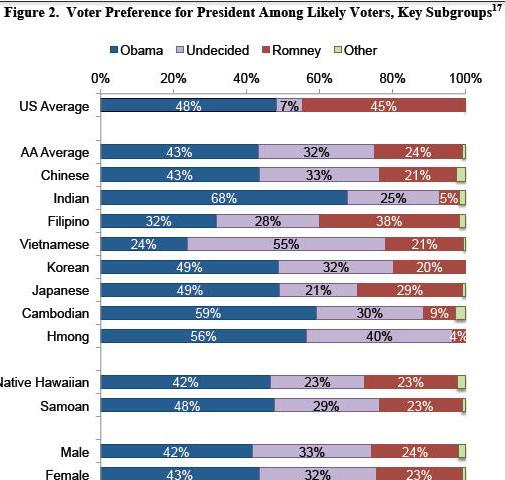In five days, Americans will be heading to the polls to decide whether President Barack Obama gets another four-year term or if his Republican opponent Mitt Romney will get the keys to the White House instead. And as the narrative of the United States media goes, this race will go down the wire. In close elections like this, a few thousand votes in the so-called tossup states like Ohio, Virginia, and Florida will almost certainly determine who the US president will be.
Will Filipino-Americans be a decisive factor in the 2012 race? Based on their number, they have the potential to do so. According to the government census for 2010, the following are the largest Asian groups in the United States:
Chinese (including Taiwanese) – 4,010,114
Filipinos – 3,416,840
Indian – 3,183,063

The US Census Bureau (USCB) notes that Indians, Chinese, and Filipinos comprise 60 percent of the Asian-American population. The abovementioned number of Filipinos in US for 2010 is an increase of over 30 percent from the population of 2,364,815 in year 2000. USCB figures also show that the bulk of Filipinos are living in the following metropolitan areas:
Honolulu, Hawaii
Phoenix-Mesa, Glendale, Arizona
Los Angeles-Santa Ana-Long Beach, California
Sacramento-Arden-Arcade-Roseville, California
San Francisco-Oakland-Fremont, California
San Jose-Sunnyvale-San Jose, California
Washington–Arlington–Alexandria, DC–VA–MD–WV*
Boston-Cambridge-Quincy, MA-NH*
Detroit-Warren-Livonia, Michigan*
Las Vegas-Paradise, Nevada*
Philadelphia–Camden–Wilmington, PA-NJ-DE-MD*

Those with asterisks are metropolitan areas that are in the so-called swing states. One estimate says that 15% of Filipinos live in swing state, which means their support might prove to be decisive in determining who between Obama and Romney will carry Virginia, New Hampshire, Michigan, Nevada, and Pennsylvania. Yesterday, Las Vegas Sun, one of the influential dailies in Nevada, bemoaned that Asian-Americans are one of the “greatest untapped voting blocs this year.” That hasn’t always been the case.
Two years ago, Senate Majority Leader Harry Reid of Nevada campaigned with Filipino boxing superstar Manny Pacquiao in Las Vegas just five days before the midterm elections. Reid at that time was in the homestretch of his tough reelection battle against Republican Sharron Angle. He ended up winning by five points despite several surveys suggesting that he will lose.
Barack Obama’s problem among Filipino-Americans
A study released by the National Asian American Survey (NAAS) last September released that support among Filipino-Americans for Obama is lukewarm. To begin with, 27 % of Filipinos identify themselves as Republicans, 24% are Democrats, while 55% are independents. “A larger portion of Filipinos now identify with the Republican Party than any Asian American group,” the NAAS added.

In 2008, Filipinos favored Obama over Republican John McCain by just four points (50 to 46), lower than the former’s national vote share of 53%. Obama’s approval rating among Filipinos is only 45%. In contrast, 81% of Indians and 55% of Chinese approved of his job.
Consequently, more Filipinos prefer Romney, a former governor of Massachusetts, over Barack Obama (38% against 32%, with 28% undecided). Filipinos gives Romney his highest level of support among all Asian American groups. This stands in contrast with the fact that Asian Americans as a whole overwhelmingly favors Obama over Romney, 43 percent to 24.

Reflecting the national trend, most Asian Americans identified economy and unemployment as the most important problem the United States is facing. The population of Filipino-Americans in the United States may not be as large compared to Latinos and African Americans, but in close races such as this one, a few thousand votes can end up determining who wins and who loses on November 6.
*Obama and Romney’s third and final debate was held in Boca Raton, Florida last October 22. It focused on foreign policy, but occasionally strayed on domestic issues. China was discussed during the 90-minute debate, with Obama trumpeting the charges his government filed against the country over trade violations. Romney took a harsher tone, vowing to brand China a currency manipulator as soon as he takes office. China’s military buildup and its territorial dispute against the Philippines was not brought up.
MUST READ:
Beijing is rewriting the past to justify its expansive claims to disputed waters by Philip Bowring for The Wall Street Journal
Asian-Americans one of greatest untapped voting blocs this year in Las Vegas Sun
Would Romney be a better ally for the Philippines? in Rappler.com







Excellent article about the 2012 US Election! I have Filipino friends in Florida, NY and Ohio and they are Republicans for the most part but a few are Independent voters. Most are voting for Romney this time.
As an American living in the Philippines, I keep up with all the latest US News online, so I know the issues, daily. I voted already via absentee ballot and I sent my ballot by Fax to my county in Florida. I usually vote Republican and this election was no exception. However, I would have no qualms voting for a Democratic candidate if I thought they were the better choice. I have voted for Democratic candidates in the past.
You have made some decent points there. I checked on the web for
additional information about the issue and found most individuals will go along with your views
on this web site.